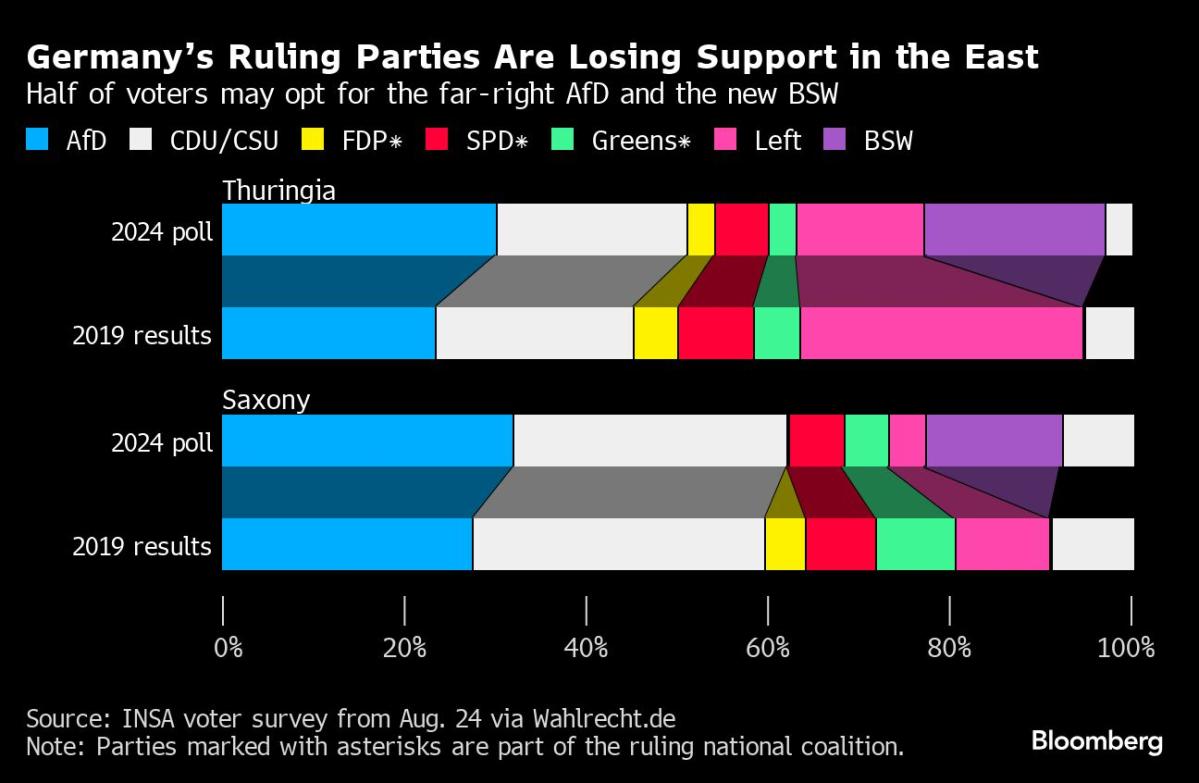(Bloomberg) — The eastern German states of Saxony and Thuringia vote Sunday in elections that are expected to see the far-right Alternative for Germany become the strongest party in at least one of the two former communist regions for the first time.
Most Read from Bloomberg
A new far-left party, the Buendnis Sahra Wagenknecht — which like the AfD wants to curb immigration — is also likely to do well in both states, where frustration with Chancellor Olaf Scholz’s ruling coalition has been growing. Opinion polls suggest that populists — including Wagenknecht’s former party Die Linke — are on course to secure a majority in the two regions, where voting patterns differ significantly from those in the west.
Even if it beats the conservative Christian Democrats into second place to win one or both ballots, the AfD is unlikely to be able to form a government. It almost certainly won’t command a majority of seats and all other parties have ruled out cooperating with it in any coalition. Still, AfD success and poor performances from mainstream parties would add to evidence that Germany’s political center is crumbling just over one year before the next scheduled federal election.
The rise of fringe forces has stoked concerns that Germany’s reputation as a business location will be damaged and sorely needed skilled workers will be put off taking up opportunities in Europe’s biggest economy. It’s unlikely, though, to unsettle markets to the same degree as happened in France after President Emmanuel Macron called a snap legislative election in June.
Exit polls will be published at 6 p.m. local time, with preliminary results following a few hours later. Here’s what to watch:
Frustration
Following months of squabbling over spending priorities, the three parties in Scholz’s ruling alliance are likely to end up as the biggest losers. Polls suggest they’ll barely muster combined support of 10% in either region.
Scholz’s Social Democrats and the Greens are in danger of missing the 5% threshold for getting into the state parliament, which could complicate the arithmetic around forming a viable government.
The other party in the coalition, the business-friendly Free Democrats, barely registers in the polls.
Another weak performance by the SPD might spark fresh debate about whether Scholz is the right man to lead the country into the next national election. As an alternative, the party could consider the popular defense minister, Boris Pistorius, as their chancellor candidate in 2025.
Fringe
In Thuringia, an early stronghold of the Nazis in the 1930s, polls suggest the AfD will come first with roughly 30% of the vote, nearly double its level of support nationwide.
Björn Höcke, the party’s lead candidate in the state, is a standard bearer for the more extreme AfD elements. He has been fined for repeatedly using banned Nazi slogans and called the Holocaust memorial in Berlin “a monument of shame.”
The Christian Democratic Union — the party of former Chancellor Angela Merkel — is projected to come second on around 22%, a few percentage points ahead of the BSW.
In Saxony, polls predict a close race between the AfD and the CDU, with both parties on around 30% and the BSW trailing on about 13%.
The BSW, which opposes aid to Ukraine and wants improved ties with Russia, could play a key roll in maintaining the so-called firewall against the AfD by joining a coalition or cooperating informally with other parties to keep it out of power in either state.
Fragmentation
There is a considerable risk that a strong performance by the AfD and the broader fragmentation of the political landscape could render at least one of the two eastern regions ungovernable.
If the AfD secures more than a third of the seats in the state parliaments, it could potentially block major decisions such as judicial appointments.
With many voters still undecided, the outcome of the elections could still surprise. A fatal knife attack in western Germany last month by a rejected Syrian asylum seeker again put the issues of security and immigration front and center.
Pollsters disagree to what extent the incident — in which three people died and eight were injured — might boost support for fringe parties.
In a sign of the pressure on the government to act, it announced Friday that 28 Afghan nationals who had been convicted of crimes were sent back to their home country for the first time since the Taliban returned to power in August 2021.
Most Read from Bloomberg Businessweek
©2024 Bloomberg L.P.

